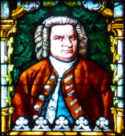Aspiring pianists strive to perform with power, flair, and with a type of sound that is distinctive. Reaching this level of musicality naturally requires immense effort and dedication. It also requires a vivid imagination, in order to be able to tell a story with one’s playing. But how does one develop a musical imagination? My answer is rather simple: play some Bach.
Developing a Musical Imagination
 Now, if one were to open a score for Johann Sebastian Bach’s music and compare it to a score by a composer like Chopin, one would notice that there are far fewer markings and directions in Bach’s music. This is to be expected, as Baroque era music typically was to be played with the performer adding in his/her own ornamentation and deciding on phrasing, articulation, and dynamics through informed decisions based on what was written on the page. There is far more room for interpretation as compared to music of later composers.
Now, if one were to open a score for Johann Sebastian Bach’s music and compare it to a score by a composer like Chopin, one would notice that there are far fewer markings and directions in Bach’s music. This is to be expected, as Baroque era music typically was to be played with the performer adding in his/her own ornamentation and deciding on phrasing, articulation, and dynamics through informed decisions based on what was written on the page. There is far more room for interpretation as compared to music of later composers.
Of course, there are still limits, but finding the multitude of ways to work around them helps foster imagination and musicality. This is exactly why I think that Bach is the key to honing these skills.
Why Bach Inspires Imagination
There are other Baroque composers, but Bach is undoubtedly one of the most famous and popular ones, especially for pianists.
One has to understand and gain a feel for how musical phrasing and harmony work to provide an enjoyable interpretation of Bach’s music, and one can interpret such seemingly minimalistic music in numerous ways. A single piece can be learned and relearned in several different ways. I myself have developed three different styles with which to play the Prelude to Bach’s second English Suite, and have found it helpful in broadening my horizons.
The best part is that by developing a musicality and instinct in playing Bach, one will naturally develop an imagination that can be applied to the music of other composers. Most composers who came after Bach were in some way inspired by him, especially in writing counterpoint.
After immersing oneself in the music of Bach and developing one’s own interpretation (which is sure to represent one’s own style, assuming the music was studied according one’s own informed decisions and habits), one can extrapolate the resulting development to studying other types of music. This can be done either by hearing/seeing the similarities to the structure in Bach’s music, or by examining the differences in styles and thus further building up one’s tools of musical playing.
Among the best reasons Bach’s music stretches the imagination is that the music is complex and emotionally quite expressive. Bach’s music is a requirement in the successful pianist’s repertoire, so serious students already know the pieces’ basics. What’s more, excellent examples of interpretation by other pianists are easily found to help one understand how much is possible when pianists utilize their “musical imagination.”
To explore this music for yourself is to learn how to strengthen your musical imagination as well as discovering the joy of his compositions, both as a method for developing technique and as beautiful music.